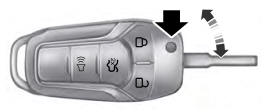Ford Explorer: Driving Aids / Pre-Collision Assist
WARNING: You are responsible for controlling your vehicle at all times. The system is designed to be an aid and does not relieve you of your responsibility to drive with due care and attention. Failure to follow this instruction could result in the loss of control of your vehicle, personal injury or death.
WARNING: The system does not detect vehicles that are driving in a different direction, cyclists or animals. Failure to take care may result in the loss of control of your vehicle, serious personal injury or death.
WARNING: The system does not operate during hard acceleration or steering. Failure to take care may lead to a crash or personal injury.
WARNING: The system may fail or operate with reduced function during cold and severe weather conditions. Snow, ice, rain, spray and fog can adversely affect the system. Keep the front camera and radar free of snow and ice. Failure to take care may result in the loss of control of your vehicle, serious personal injury or death.
WARNING: In situations where the vehicle camera has limited detection capability, this may reduce system performance. These situations include but are not limited to direct or low sunlight, vehicles at night without tail lights, unconventional vehicle types, pedestrians with complex backgrounds, partly obscured pedestrians, or pedestrians that the system cannot distinguish from a group. Failure to take care may result in the loss of control of your vehicle, serious personal injury or death.
WARNING: The system cannot help prevent all crashes. Do not rely on this system to replace driver judgment and the need to maintain a safe distance and speed.
Using the Pre-Collision Assist System
The system is active at speeds above approximately 3 mph (5 km/h) and pedestrian detection is active at speeds up to 50 mph (80 km/h).

If your vehicle is rapidly approaching another stationary vehicle, a vehicle traveling in the same direction as yours, or a pedestrian within your driving path, the system is designed to provide three levels of functionality:
- Alert
- Brake Support
- Active Braking
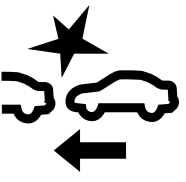
Alert: When active, a flashing visual warning appears and an audible warning tone sounds.
Brake Support: The system is designed to help reduce the impact speed by preparing the brakes for rapid braking. Brake support does not automatically apply the brakes. If you press the brake pedal, the system could apply additional braking up to maximum braking force, even if you lightly press the brake pedal.
Active Braking: Active braking may activate if the system determines that a collision is imminent. The system may help the driver reduce impact damage or avoid the crash completely.
Note: Brake Support and Active Braking are active at speeds up to 75 mph (120 km/h). If your vehicle has a radar sensor included with Adaptive Cruise Control, then Brake Support and Active Braking are active up to the maximum speed of the vehicle.
Note: If you perceive Pre-Collision Assist alerts as being too frequent or disturbing, then you can reduce the alert sensitivity, though the manufacturer recommends using the highest sensitivity setting where possible. Setting lower sensitivity would lead to fewer and later system warnings.
Distance Indication and Alert (If Equipped)
Distance Indication and Alert is a function that provides the driver with a graphical indication of the time gap to other preceding vehicles traveling in the same direction. Distance Indication and Alert shows one of the graphics that follow in the information display.
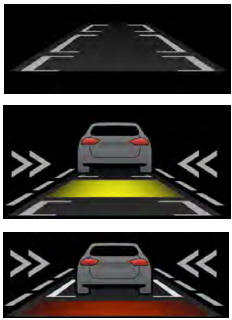
If the time gap to a preceding vehicle is small, a red visual indication displays to the driver.
Note: Distance Indication and Alert deactivates and the graphics do not display when Adaptive Cruise Control is active.

Evasive Steering Assist (If Equipped)
If your vehicle is rapidly approaching a stationary vehicle or a vehicle traveling in the same direction as your vehicle, the system is designed to help you steer around the vehicle.
The system only activates when all of the following occur:
- The Pre-Collision Assist system detects a vehicle ahead and starts to apply Active Braking.
- You turn the steering wheel in an attempt to steer around the vehicle.
After you turn the steering wheel, the system applies additional steering torque to help you steer around the vehicle. After you pass the vehicle, the system applies steering torque in the opposite direction to encourage you to steer back into the lane. The system deactivates after you fully pass the vehicle.
Note: The system does not automatically steer around a vehicle. If you do not turn the steering wheel, the system does not activate.
Note: The system does not activate if the distance to the vehicle ahead is too small and the system cannot avoid a crash.
Adjusting the Pre-Collision Assist Settings
You can adjust the following settings by using the touchscreen. See Settings.
- You can change Alert and Distance Alert sensitivity to one of three possible settings.
- You can switch Distance Indication and Alert on or off.
- If required, you can switch Active Braking on or off.
- If required, you can switch Evasive Steering Assist on or off.
Note: Active Braking and Evasive Steering Assist automatically turn on every time you switch the ignition on.
Note: If you switch Active Braking off, Evasive Steering Assist turns off.
Blocked Sensors
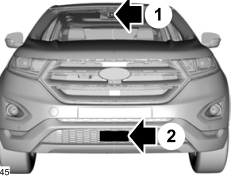
1 - Camera.
2 - Radar sensor (if equipped).
If a message regarding a blocked sensor or camera appears in the information display, the radar signals or camera images are obstructed. If your vehicle has a radar sensor, it is behind the fascia cover in the center of the lower grille. With a blocked sensor or camera, the Pre-Collision Assist system may not function, or performance may reduce. The following table lists possible causes and actions for when this message displays.
Camera Troubleshooting

Radar Troubleshooting (If Equipped)
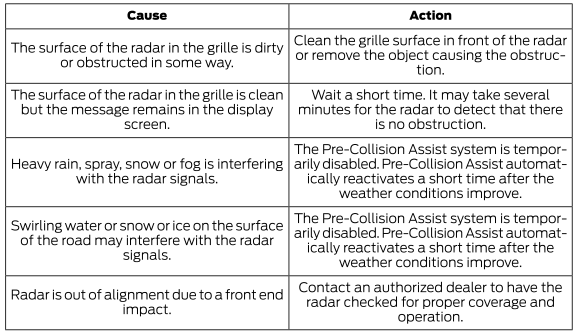
Note: Proper system operation requires a clear view of the road by the camera. Have any windshield damage in the area of the camera's field of view repaired.
Note: If something hits the front end of your vehicle or damage occurs and your vehicle has a radar sensor, the radar sensing zone may change. This could cause missed or false detections. Contact an authorized dealer to have the radar checked for proper coverage and operation.
 Steering
Steering
Electric Power Steering
WARNING: The electric power steering system has diagnostic checks that
continuously monitor the system. If a fault is detected, a message displays in the
information displ..
Other information:
Ford Explorer 2020-2026 Service Manual: Removal and Installation - Interior Rear Door Handle
Removal NOTE: LH (left-hand) side shown, RH (right-hand) side similar. Remove the rear trim panel. Refer to: Rear Door Trim Panel (501-05 Interior Trim and Ornamentation, Removal and Installation). Remove the interior rear door handle...
Ford Explorer 2020-2026 Service Manual: General Procedures - Seatbelt Twisted at the Seatbelt Guide
Adjustment NOTE: Typical D-ring shown, others similar. If required, remove the necessary trim panel(s). Fold the seatbelt as indicated. Feed the folded portion of the seatbelt into the D-ring. Pull the seatbelt through the D-ring to remove the twist in the seatbelt...
Categories
- Manuals Home
- 6th Generation Explorer Owners Manual
- 6th Generation Explorer Service Manual
- Body and Paint
- Using Tether Straps
- Description and Operation - Identification Codes
- New on site
- Most important about car
Integrated Keyhead Transmitter (If Equipped)
Use the key blade to start your vehicle and unlock or lock the driver door from outside your vehicle. The integrated keyhead transmitter functions as a programmed ignition key that operates all the locks and starts your vehicle, as well as a remote control.
